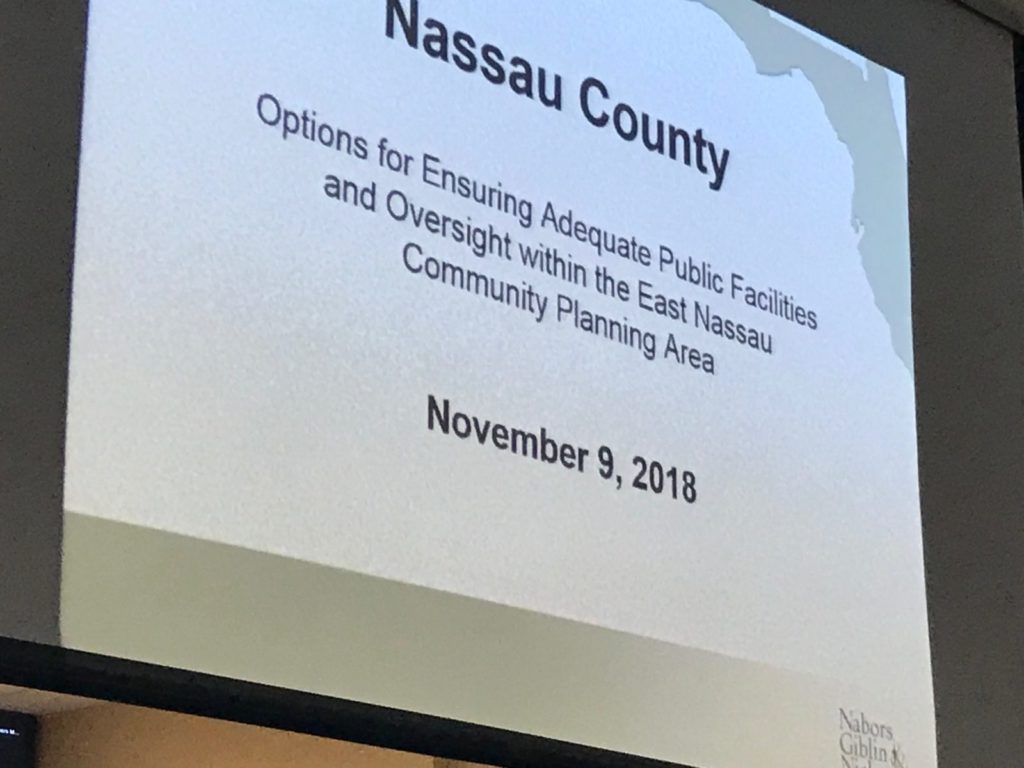By Cindy Jackson
Reporter
November 11, 2018 4:00 p.m.
The Nassau County Board of Commissioners (BOCC) convened a special meeting on Friday, November 9th. First on the agenda was a presentation by the law firm of Nabors, Gilbin and Nickerson on the subject of the East Nassau Community Planning Area (ENCPA) and the East Nassau Stewardship District (ENSD).
 The BOCC hired Nabors, Giblin and Nickerson in an attempt to seek a remedy to stalemate between the county and Rayonier/Radient Property and Places.
The BOCC hired Nabors, Giblin and Nickerson in an attempt to seek a remedy to stalemate between the county and Rayonier/Radient Property and Places.
According to its website, the firm “concentrates its practice in representing municipalities, counties, school districts, special districts, and related financial and governmental entities in all areas of local government and state finance and tax law. NG&N maintains offices in Tallahassee, Tampa and Fort Lauderdale.” The firm has worked with Nassau County many times over the years.

Partner Heather J. Encinosa made the presentation, outlining a number of options for commissioners to consider. Included was the adoption of a Municipal Services Taxing Unit (MSTU) and an updated parks and recreation impact fee. The county has already employed an outside consultant to study the impact fee proposal and as with fees of this type, certain legal restrictions would apply.
OMB director Justin Stankiewicz reminded commissioners that an MSTU had already been approved but that the millage rate could not be set until July 2019.
A third option would be a Parks and Recreational Optional Concurrency, explaining that “concurrency is a shorthand expression for a set of land use regulations that local governments adopt to ensure that new development does not outstrip local governments ability to handle it. For a development to “be concurrent” or “meet concurrency” the local government must have enough infrastructure capacity to serve each proposed development.” Under state statute, sanitary sewer, solid waste, drainage and potable water are the only mandatory concurrency but local governments are allowed to extend the concurrency requirement to additional public facilities. To facilitate “concurrency” there would need to be an amendment made to the county’s comprehensive plan and then changes in land development regulations modified to reflect those changes.
From there, Ms. Encinosa went on to discuss other possible “cures” that might be possible through the state legislative process, including amending HB 1075 (which created the ENSD) with a provision to mandate that the District fulfill its promises to finance infrastructure and enhancements for recreational purposes or putting an amendment in place that would put additional protections in place including mandates for reporting and coordination.
The mobility fee network and tax increment financing (TIF), currently set at 12%, were also discussed as possible areas for change. A five year review of the mobility fee commenced in July and recommendations are due in the next 45-60 days.
The ultimate goal is to “reset” the public/private partnership.
Commissioner Edwards said at one point “I don’t want to be a partner with a corporation,” and stressed the need for a multi-prong approach to provide for the recreational infrastructure of the ENSD. Commissioner Leeper asked about more local options and Commissioner Kelley asked if the county could “just get out it?” “It” being HB 1075 to which Encinosa explained that once a special district is created, to do away with it would require a referendum of the landowners which Kelley summarized as the BOCC “asking their permission” to end the agreement.

The commissioners, concerned about accountability and responsibility to Nassau County residents, appeared to be united in their distrust of the body that is Rayonier and anxious to get things in motion. Commissioner-elect Aaron Bell (District 2) was also in attendance and expressed his support for the multi-pronged approach and particularly the concurrency option.
Nabors, Gilbin and Nickerson are expected to report back to the BOCC after receiving additional information from the outside consultants currently reviewing impact and mobility fees.
The next meeting of the BOCC is scheduled for November 26th at 6PM.
The next Ask the County Manager meeting is set for November 13th from 3-4pm. These meetings take place in the Commission Chambers located at 96135 Nassau Place, Yulee, Florida.
“A Simple Question for the BCC – Where’s the beef?
 Editor’s Note: Born in Hagerstown, Maryland, Cindy received her BA in Political Science from Dickinson College. Upon graduation, Cindy began her career on Capitol Hill working as a legislative aide and director. She later became a part of the public relations and lobbying team of the American Iron and Steel Institute and served as director of the office of state legislative affairs for the Aircraft Owners and Pilots Association (AOPA). Cindy was involved in economic development with the state of Maryland, and served as executive director of Leadership Washington County. As a community volunteer, Cindy participates in numerous volunteer activities serving as a member of Sunrise Rotary, and as board member of Cummer Amelia Board of Directors.
Editor’s Note: Born in Hagerstown, Maryland, Cindy received her BA in Political Science from Dickinson College. Upon graduation, Cindy began her career on Capitol Hill working as a legislative aide and director. She later became a part of the public relations and lobbying team of the American Iron and Steel Institute and served as director of the office of state legislative affairs for the Aircraft Owners and Pilots Association (AOPA). Cindy was involved in economic development with the state of Maryland, and served as executive director of Leadership Washington County. As a community volunteer, Cindy participates in numerous volunteer activities serving as a member of Sunrise Rotary, and as board member of Cummer Amelia Board of Directors.
